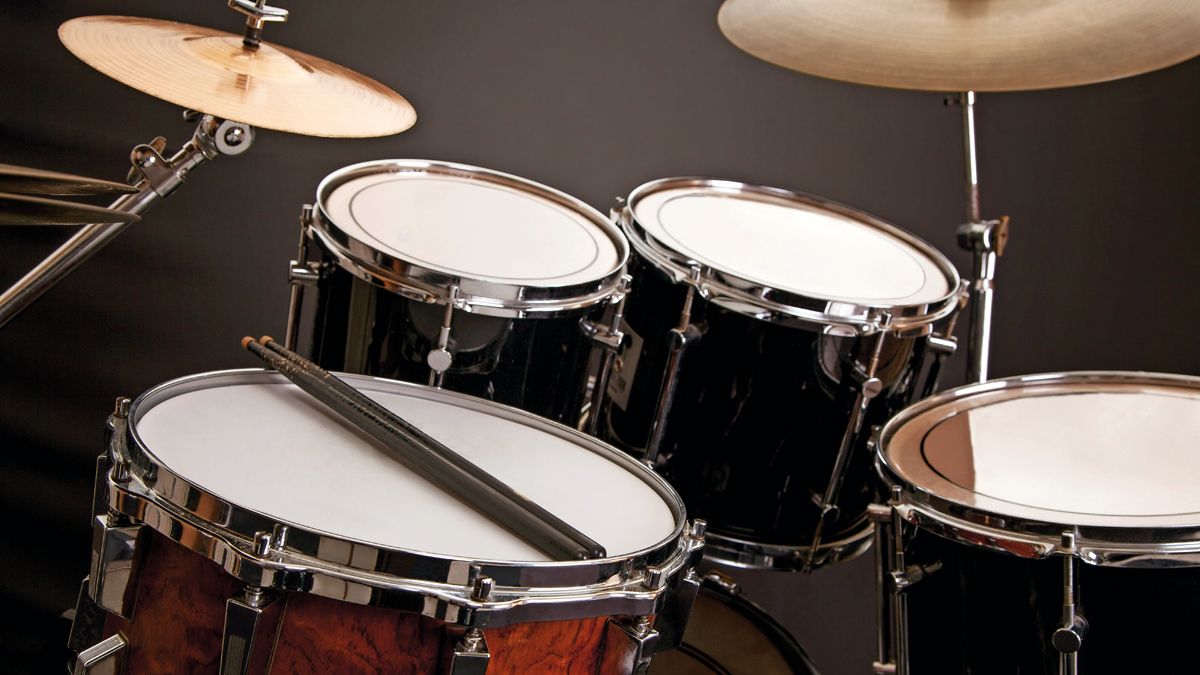The Music Business has changed & I’m still alive (part 1)…
December 6, 2015 (revised in 2020)…
Wanting to be a professional musician began sometime in the 70’s. I cannot recall one particular “trigger” event that paved the way, but I’ll list a few relevant experiences—my own magical mystery tour. At 51, I’m still confused, but I’m forging ahead with the journey… I’ll propose a few theories and ask for input from musical people in my life. Finally, I’ll drop a few names and recommend some books, websites, or other relevant sources to explain my version of the Music Business… I’ll be opening up Pandora’s Box and YOU can put the remaining pieces together. Please respond and offer your point of view. Let’s connect.
What did I experience in the 70’s and early 80’s? It’s a loaded question. However, I recall listening to endless hours of Pop Radio, hearing a Keyboardist, named Gary, at my sister’s Bat-Mitzvah (Joyce) circa 1976. The Lunenfeld’s (sic) Attended my other sister’s Bat-Mitzvah (Carolyn), circa 1979, and we attended the Lunenfeld’s Bar-Mitzvah around the same time. Finally, my Uncle Harry scored tickets to see Zubin Meta at the NYC Philharmonic at Lincoln Center a few times.
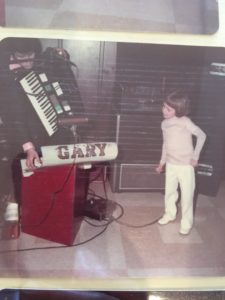
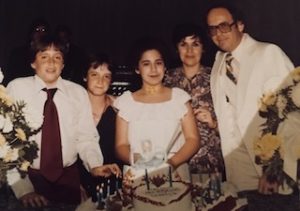
I listened to WABC radio in the 70’s, which played hits—a mix of AOR (album oriented Rock), Pop, Funk, R & B, ballads, some adult easy listening, and a multitude of Disco selections. The idea behind a “hit” is to hook people on a catchy song in hopes that they will buy an artist’s entire album/product. Getting a song aired on the radio to become a “hit” symbolized making it into the BIG TIME. I didn’t think of it that way when I was younger, nor did I view music as a marketing medium or business… Since people could not preview 30+ seconds of every song on an album, it was all about marketing that one magical hit. There is a book entitled “Hitmen,” that explores how an influential network of business people purport to have “ears” and can hear a “hit.” However, hit promotion also involved shady deals, such as paying off people in radio: Payola. The remainder of the “Hitmen” book discusses power, control, more shady deals, deceptive marketing, false promises, sucker deals, and the ability to decide who gets famous, and whose talent gets flushed down the toilet. I was oblivious to payola until circa 1992. In other aspects of my life, I knew that slipping people a few bucks did yield results, e.g. slipping the mechanic $50.00 to avoid receiving a $500.00 bill for changing 2 spark plugs. During the 70’s and 80’s, however, I just loved music and never considered its business implications.
During my 70’s childhood, there seemed to be a social divide between Pop Radio and Classic Rock/Heavy Metal—synonymous to either being a Yankee or Mets fan, Rangers or Islanders fan. In short, I had to choose ONE and deal with consequences from peers. At first, I defaulted to WABC instead of Classic Rock stations (WNEW FM et al) because it spoke to me. Yes, I loved FM Radio and Disco! I owned several boom boxes with AM/FM, shortwave bandwidth, and cassette. I carried it around in the freezing cold along the Staten Island streets. I would strut around my neighborhood with my head held up high to support the boom box. It’s no secret that I didn’t like neither the racist students in middle school, nor my neighborhood. With the exception of a few people, music was my only true friend. While I liked some sports, especially baseball, I was never part of any team, except during various summer camps… Hence, I carried spare “D” batteries in my denim jacket to avoid feeling empty when the music died. My father was in the electrical business and used to bring home a plethora of C and D batteries. Luckily, he didn’t include that as part of my $10.00 weekly allowance. I couldn’t just plug in my radio boombox and strut in public. I was also too young to drive, so 12V DC wasn’t an option. Batteries were my transitory friends.
As I alluded to earlier, my mother hired a Keyboardist, Gary. Refer to the cute picture. He was a solo act, who sang, and played some accordion/keyboard hybrid, along with a steady drum machine, and a small PA to hear the vocals. All I know is that I stared at him during the entire celebration while my mother badgered me about dancing with my “grandmutha” and being available for pictures. I was captivated and not even sure why; his sound and aura just hypnotized me. Prior to Joyce’s major event, my Uncle Harry somehow scored front row center seats to Lincoln Center. I do remember wanting to play violin as a child, but that never materialized. Nevertheless, the Philharmonic Orchestra was amazing… Fast forward to circa 1979… I attended Steven and Jeffrey’s Bar Mitzvah in Gaithersburg, MD. They hired a band that played a variety, but mainly Classic Rock (Stones, CCR, et al); Jeffrey also sat in to play drums. He played his version of Rocky (gonna fly now) on snare drum as a featured soloist. As a result, I was hooked on Rock and wanted to be a drummer. When I brought the idea to my mother, she told me that I needed 3 years of Piano lessons before I “hit anything and make noise.” After the 3-year commitment, I could venture into drums. I agreed.
The remaining details consist of a collection of vague memories listening to a hodgepodge of POP on the WABC rotation, but somehow heard Earth, Wind, & Fire, Donna Summer, Peaches & Herb, Broadway Music, Barry White, 50’s, (WCBS FM with Franki Valli and the 4 seasons), 60’s (The Beatles), 70’s (Billy Joel, Elton John, Led Zeppelin, et al), sporadic Jazz, a myriad of one hit wonders (E.G. The Pina Colada Song Escape and Lonely Boy from Andrew Gold), Sugar Hill Rap, Blondie, more New Wave, a little Punk (apparently, a reaction to New Wave and Disco amidst other historical and political events…), etc. I collected whatever Vinyl records I could find, 8-track tapes (Back in Black from ACDC melted my brain), and even cassettes from friends, family, flea markets, and garage sales. I listened to music after school daily for hours until dinner. I took the bus after school to the Staten Island Mall. Music Land was the place to go after 30 minutes in the Arcade (called Time Out), but there were others—Crazy Eddie, The Wiz, Music Factory, Peaches (when I visited relatives in Florida), etc. I would read every jacket and learn the names of the band members, producers, and record labels. After finishing my HW around dinnertime, I listened to more, and called whoever would listen to my obsessive rants on the army green rotary house phone. I was making free mix tapes for people and I lost money. However, I didn’t care about the money.
When I watched TV, I learned all of the TV Show Themes. I thought I could sing because I was an Alto (border line Soprano) in Middle School Chorus until puberty hit. However, I still flipped through network channels to learn all of the melodies. During that time, people would have intense conversations about TV show themes. Sure they might have been into the plot and characters. However, I new that TV music was important and valued. Moreover, studio musicians were paid well (arguably) to record music for television. Arranging and producing music for television was not only valued, but highly demanded. Listen to “The Jetsons” and you’ll hear some complicated orchestrations and arrangements. Movie soundtracks and film scoring were also BIG business… There was a TV show in the 70’s called “Name That Tune…” I used to watch it frequently and hoped that I could be a contestant one day… That dream ended when the show was enigmatically cancelled. Perhaps, music was something to be enjoyed as an introduction or background ambience; maybe, it wasn’t meant to be a main attraction on a TV medium; perhaps it failed visually to keep someone’s attention span—it’s conjecture.
During the summers, I went to various camps and became friendly with anyone who played a musical instrument or a true music listening aficionado. All of my counselors had radios in the bunks; we always listened to music prior to lights out. One night, there was a huge rainstorm and lightening struck; Stanley’s radio was fried. Luckily, no one was hurt. This event became fodder for many jokes, and it was also considered legendary: “…did you hear about Stanley’s radio…” I guess the idea of blowing up a radio was sacrilegious; it’s hard to interpret the symbolism, but I do know that people did not want to be without music on a daily basis. During that same period in the early 80’s, I asked the music counselor, Spencer, if we could play Name That Tune instead of just singing banal camp repertoire (Peter, Paul and Mary and random cheesy soft Folk Rock selections)? He agreed and asked me if I wanted to play name that tune against ALL of the male teens. I thought he was insane for suggesting the idea, but I agreed to try. It turns out that I defeated approximately 50+ teens. Was I a genius? No! Music had consumed me 24/7 and it wasn’t a seasonal obsession.
Here is a Camp Louemma Reunion photo circa 2010:
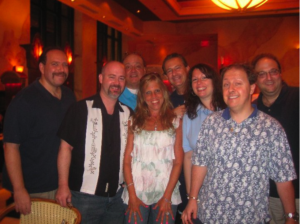
Piano lessons took place from 1980-1982. My talented piano teacher, Joy Matthews, stopped showing up for lessons after 3 years. I asked my mother about the drums and she said something along the lines of: “you won’t ever play drums in this house because you’ll become a nervous wreck…you want to be a Jewish Drumma?” The term disappointment couldn’t possibly cover the gamut of emotions. Immediately following that buzz-killing conversation and took whatever money I had to Lane Music, on New Dorp Lane in Staten Island—5 train stops away from Eltingville (sic). I bought a cheap chrome snare drum, Camber High Hats, and a dirty Zildjian Crash/Ride cymbal. I “schlepped” the equipment in a moldy box to the train station and walked a few miles in the cold. Then, I hid the equipment in the garage so my mother would not find out. Weeks later, a friend in Middle School, Anthony, introduced me to The Police—a trio that combined Punk, Reggae, Ska, Rock, and something else… That was the start of my drumming life. I also remember listening to Blondie’s Heart of Glass and mesmerized by the thumping Bass Drum and crispy Hi Hat sound.
Since my drumming had to be a secret, I wasn’t able to take lessons and get better. All I had was the limited equipment, obsession, and my ears. Somewhere in 9th Grade, I formed a band called OMEGA: Anthony played rhythm guitar, the late Michael Twomey played lead guitar, I attempted to play drums with a cheap Blue Japanese Tempro Sparkle kit, and my new HS friends (John B. sang and Kenny G. played bass) joined us. Our mission was to play some Police, Judas Priest, Iron Maiden, KISS, Sabbath, Van Halen, ACDC, et al. We thought we were good, but we weren’t. The best one in the band—without reservation–was Mike Twomey, the guitarist who played a Gibson SG (just like Angus from ACDC). Mike’s father dropped him off at my house after school. He carried in the heaviest Ampeg Amp on Earth, his SG axe, an array of stomp box pedals (The MXR orange phaser was awesome), and a bag of 9-Volt batteries. Sadly, I found out that Mike passed away a year ago from Cancer. Besides changing the lives of thousands, Mike was beyond talented. He’d play Van Halen’s Eruption with ease, King Crimson guitar parts in 7/8, Ozzy Osbourne’s Crazy Train to a T, and a repertoire of several hundred songs. This is the ONLY remaining Polaroid of “Omega.” Here are the members from left to right: Kenny (Bass), Michael Twombey (RIP, Guitar God), Jonathan (Vocals), and Evan J. on drums…
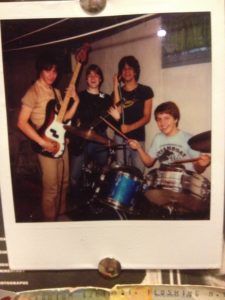
The rest of us were playing by ear, writing down licks on scraps of paper, or begging people to show us how to play parts. I remember using a tape recorder with weak batteries to slow down the tape speed. We didn’t have videos, YouTube, Apps, AutoTune, or Guitar Hero, other computer games to become proficient. I didn’t have enough money to buy a 4-track recorder to actually hear myself. Advanced technology was unattainable; our equipment was poor to average at best. Check out a picture of the first Peavey Mixer Board we bought with money from our piggy banks:
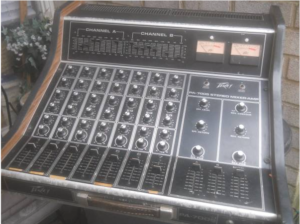
We used any remaining funds to see live shows around the NYC area. We valued active listening, reading the credits on vinyl jackets, loving the artwork, buying music merchandise to flaunt (promote) our favorite artists of the week, and figuring out a way to earn more money to get better equipment. I went to work with my father on Saturday’s and helped a friend deliver newspapers by bike in the freezing cold because I needed cash.
After months of practicing, we decided to play our first live concert at Tottenville HS in 1983. I remember making phone calls until my parents yelled at me (call waiting wasn’t on the plan yet) and creating every flyer by hand. I don’t remember a photocopy machine. However, I do remember giving out flyers to strangers, and riding my bike to staple every telephone poll in the freezing weather. I was determined to promote our show if it took every last breath in me. I neither knew what I was doing, nor did I have any kind of marketing expertise. Social media didn’t exist and all calls had to be made from a payphone or someone’s house. I tried to tell everyone about the 1-hour gig, and hope people would show up on a freezing school night to a gymnasium… They could opt to just stay home and watch (limited) network television while being comforted by heat, blanket, snacks, and hot chocolate. Why would they be motivated to see Omega live at Tottenville HS? The only thing I could offer them was an emotional elevator sales pitch and my intense passion for music.
Part 2: How was the first live Omega gig at Tottenville High School?
